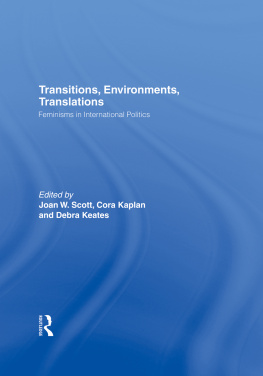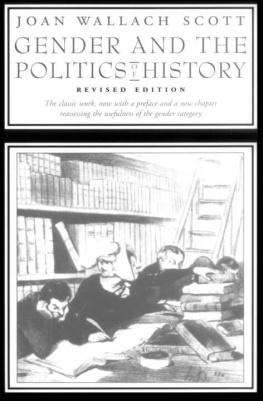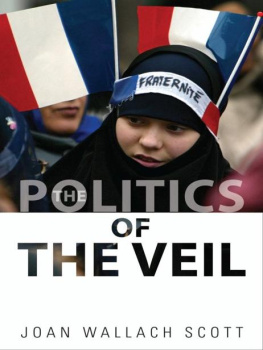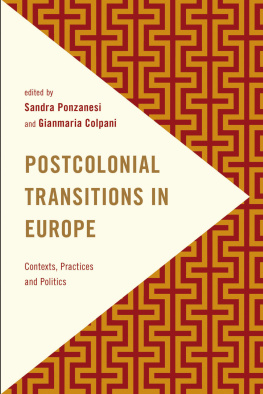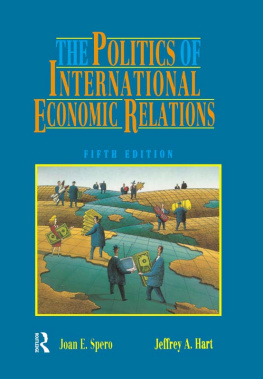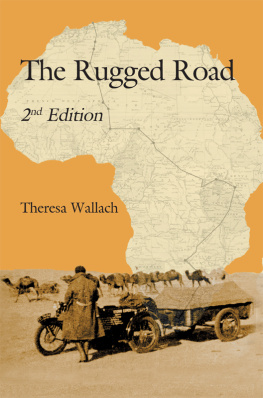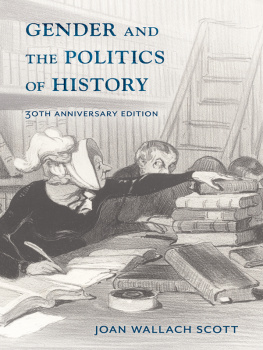Transitions, Environments, Translations
Transitions, Environments, Translations
Feminisms in International Politics
edited by
Joan W. Scott, Cora Kaplan, Debra Keates
ROUTLEDGE
New York and London
Published in 1997 by
Routledge
711 Third Avenue,
New York, NY 10017
Published in Great Britain in 1997 by
Routledge
2 Park Square, Milton Park,
Abingdon, Oxon, OX14 4RN
Transferred to Digital Printing 2011
Copyright 1997 by Routledge
Design: Jack Donner
All rights reserved. No part of this book may be reprinted or reproduced or utilized in any form or by any electronic, mechanical, or other means, now known or hereafter invented, including photocopying and recording, or in any information storage or retrieval system without permission in writing from the publishers.
Library of Congress Cataloging-in-Publication Data
Transistions, environments, translations : feminisms in international politics edited by Cora Kaplan, Debra Keates, Joan W. Scott
Revised papers from a conference held April 1995 at Rutgers University
Includes bibliographical references and index.
ISBN 0-415-91540-6 (hb) ISBN 0-415-91541-4 (pb)
1. FeminismsCongresses. I. Kaplan, Cora. II. Keates, Debra. III. Scott, Joan Wallach.
Hq1106.T73 1997
305.42dc20 96-41590
CIP
Publisher's Note
The publisher has gone to great lengths to ensure the quality of this reprint but points out that some imperfections in the original may be apparent.
Contents
Lin Chun
Peggy Watson
Susan Gal
Myra Marx Ferree
Hana Havelkovd
Djurdja Knezevic
Svetlana Slapsak
Renata Salecl
Sabine Lang
Eva Maleck-Lewy
Malgorzata Fuszara
Milica Anti Gaber
Andrea Pet
Krassimira Daskalova
Ann Snitow
Bina Agarwal
Tsehai Berhane-Selassie
Anna Lowenhaupt Tsing
Yaakov Garb
Nol Sturgeon
Evelynn M. Hammonds
Jacklyn Cock
Mamphela Ramphele
Zakia Pathak
Rosi Braidotti
Anastasia Posadskaya-Vanderbeck
Svetlana V. Kupryashkina
Afsaneh Najmabadi
Alice Kessler-Harris
The Conference which produced these papers was funded by the American Council of Learned Societies, the Ford Foundation, the Rockefeller Foundation, and the Rutgers University Research Council. We would like to thank Jason Parker, Alison Bernstein, Sheila Biddle, Alberta Arthurs, and Lynn Szwaja for their encouragement and support. For their invaluable assistance in organizing the conference, we are grateful to Lisa Marcus, Beth Hutchison, and Arlene Nora at the Institute for Research on Women at Rutgers University, and to Deborah Koehler at the Institute for Advanced Study. Meg Gilbert did yeoman work preparing the manuscript for publication, Anne Hartman was tremendously helpful in the final stages of production, and Maureen MacGrogan was a terrific editor. We appreciate the quality of their work and the generous spirit with which it was carried out.
The papers in this volume (with a few exceptions) were presented at a conference held in April 1995. Jointly organized by the Rutgers University Institute for Research on Women and the Institute for Advanced Studys School of Social Science, with funding from the Ford and Rockefeller Foundations and the American Council of Learned Societies, the conference was called Transitions, Environments, Translations: The Meaning of Feminism in Contemporary Politics. In the course of three days, scholars and scholar-activists from many parts of the world presented information, compared their situations, and analyzed one anothers premisesengaging in the kind of hard thinking and sustained debate that distinguishes academic work at its best.
After the conference, participants rewrote or revised their papers taking into account points made about their presentations as well as the issues that had become central to the discussions. We also solicited a few additional papers where they seemed particularly relevant. The organization of sections and chapters in the book departs somewhat from the conference format, for connections among papers often became apparent only when we had all the final drafts in hand. And the title has been adjusted to emphasize both the international dimensions of the project and the multiplicity of political and social movements that are referred to or refer to themselves as feminist.
By pluralizing feminism we mean to signal the variety and complexity of womens movements throughout the world. The addition of international suggests both the importance of national differences among feminists and the fact that our movements transcend national boundaries. The new title captures the central preoccupation of the conference: the attempt to articulate the relationship between feminism as a universal movement for womens rights and feminism as a set of particular movements deeply rooted in national or regional histories.
The purpose of the conference was to explore the varied meanings of feminism in different political, cultural, and historical contexts and to ask whether all movements directed at womens interests were feminist movements. We wanted to examine in concrete detail the situation of women and womens movements in recent political and economic transitions in such places as Eastern Europe, the former Soviet Union, South Africa, China, and India, and to ask what these movements had in common with one another and with their Western counterparts. Instead of asking how these movements measured up to some ideal standard (which would have been a standard based on the history of feminism in Western Europe and the United States), we considered feminism to be a site of local, national, and international political and cultural conflict. We asked: What is at stake in various collective political efforts by women in different parts of the world? What meanings have women given to their efforts? What has been their connection to feminism, as a concept and as an international movement?
The relationships between the local and the international, the particular and the universal, are not easy to disentangle. In fact, their inextricable connection and the tension between them were evident in the conference discussions and are apparent in these papers. At least since the United Nations put women on the global agenda twenty years ago, it is impossible to address questions about womens needs, interests, and rights in purely local terms. And yet there is also no single standard, no essential meaning, no common language that women can be said to share. The originary, universalist status of Enlightenment traditions has been severely challenged, and in some instances displaced, by women who consider themselves feminists, but who reject the individual-rights claims that typified feminism in Western Europe and the United States in the nineteenth and early twentieth centuries. Translation in the sense of rendering more or less faithful copies of an original does not seem to capture the emergence of feminism outside of Western Europe. And yet, to the extent that there are recognizable similarities between concepts and actions in very different locations and languages, some kind of translation does seem to be taking place. Anna Tsing, in her paper in this volume, redefines translation as a continual negotiation, an irregular, haphazard process in which terms are appropriated from one context to another and then used to do different work. She urges us to attend to the process instead of trying to locate the original and analyze the faithfulness of the copies. Faithless translation is the term she uses to describe what is going on.

